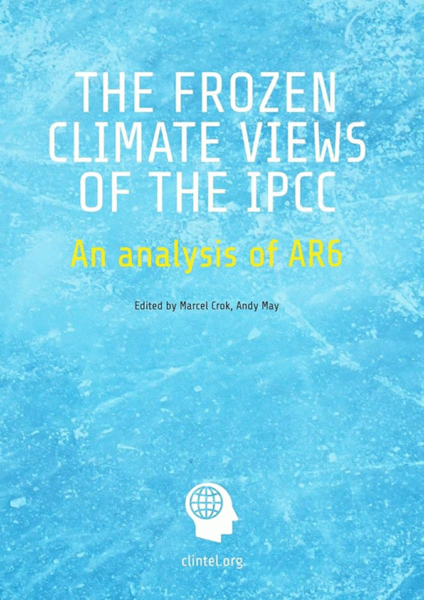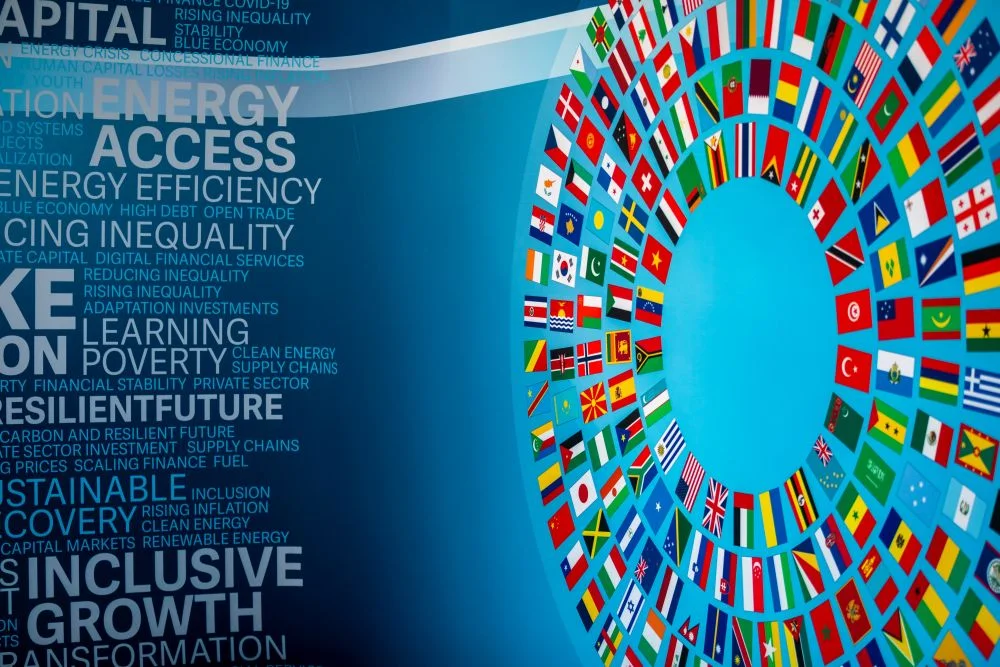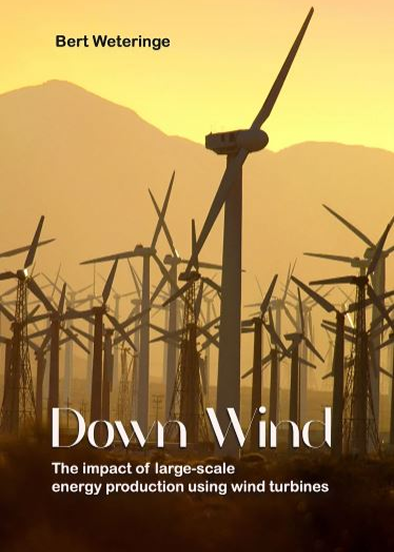IMF and World Bank indoctrinated by climate industrial complex
The Baby Boomers, born between 1946 and 1964, are arguably the luckiest generation in history. They grew up in a world reshaped by the end of World War II, decolonisation in Asia and Africa and a ‘rules-based international order’ under benign Pax Americana. The Bretton Woods institutions — the International Monetary Fund (IMF) and World Bank — were the backbone of this order.
By the mid-1990s, when the youngest Boomers hit middle age, Western Europe and Japan had risen from war’s ashes, while Asia’s ‘tiger economies’ (South Korea, Taiwan, Hong Kong, Singapore), Southeast Asian nations (Thailand, Malaysia, Indonesia, Vietnam), and population behemoths China (post-1978 Premier Deng Xiaoping’s reforms) and India (post-1991 Minister of Finance Manmohan Singh’s reforms) roared to life. The IMF and World Bank fuelled this growth with loans, infrastructure projects and economic discipline.
Today, however, these institutions are shadows of their former selves, hijacked by the ‘climate industrial complex’ and progressive crusaders pushing climate alarmism and social justice. They’ve fallen victim to regulatory capture, where well-organised interest groups — like NGOs, green lobbyists and Western elites — manipulate institutions to serve their narrow agendas at the expense of broader public welfare. With the US’s withdrawal from the Paris Agreement and the World Health Organisation under Trump’s second administration, there’s a real chance to break free from this stranglehold.
The Original Mission: Prosperity, Not Ideology
The World Bank, founded in 1944, was meant to rebuild war-torn nations and lift poorer countries out of poverty. Its International Bank for Reconstruction and Development (IBRD) and later International Development Association (IDA) funded dams, roads and farms — projects that delivered measurable growth. Its ‘World Development Report 2000/2001: Attacking Poverty‘ spelled it out: focus on real economic outcomes for economic growth and poverty alleviation, not feel-good ideals.
The IMF’s stated mission is “to foster global monetary cooperation, secure financial stability, facilitate international trade, promote high employment and sustainable economic growth, and reduce poverty around the world”. Its traditional package of policy solutions for countries undergoing financial crisis reflected the Washington consensus supporting free trade, competitive markets, entrepreneurship and sound money. It typically called on client governments to practice budget austerity, privatise state enterprises, deregulate barriers to entry and exit, and secure property rights.
These missions powered the Boomer era’s golden age. From Europe’s reconstruction to Asia’s economic miracles, the IMF and World Bank were engines of progress, aligning national ambitions with global stability. But somewhere along the way, they got side-tracked by a cabal of climate zealots and social justice warriors and their enablers in Washington and Brussels.
The Climate Industrial Complex Takes Over
The morphing of ‘corporate social responsibility’ and ‘stakeholder capitalism’ into the ESG movement that increasingly became part of the global business vocabulary can be traced to the then-United Nation Secretary-General Kofi Annan. He told business and finance leaders at WEF’s Davos forum in 1999 to initiate, with the UN, “a global compact of shared values and principles, which will give a human face to the global market”. With Annan’s speech, ESG fused with the concept of “sustainable development” under the aegis of the WEF annual meetings and the UN.
With the growth of the ESG colossus in the corporate world, the IMF and World Bank were increasingly captive to the ‘climate industrial complex‘ — a network of NGOs, bureaucrats and corporate elites pushing pseudo-scientific climate alarmism and progressive dogmas like gender equity and diversity. This is regulatory capture in action: well-organised groups, from green activists to UN and World Economic Forum (WEF) insiders, have subverted these institutions to serve their interests, leaving the diffuse needs of the unorganised poor in developing nations in the dust. As George Stigler – the economist who coined the term regulatory capture — warned, such groups maximise their own sectional interests, not the public’s general wellbeing.
Take the World Bank. Under President Jim Yong Kim (2012-2019), it banned funding for coal-fired power plants in 2013 and later nixed upstream oil and gas projects. Deepak Lal, a previous Research Administrator at the bank, slammed Kim for ignoring data showing coal’s affordability over renewables like solar or wind in poor countries. This is a betrayal of the bank’s poverty-alleviation mandate, driven by Western fantasies of a ‘climate emergency’ hyped by UN Secretary-General António Guterres, who is fond of phrases like “global boiling”.
The bank’s new initiatives — Climate Resilient Debt Clauses, Liveable Planet Funds — tie loans to green and social goals. This starves funding for conventional infrastructure projects that actually lift people out of poverty. This is what the-then senior economic advisor to the Government of India Arvind Subramaniam called carbon imperialism a decade ago, referring to Western elites imposing anti-fossil fuel rules that choke developing nations’ access to cheap forms of energy.
The IMF is no better. Originally a fiscal watchdog, it’s now cheerleading for the Network of Central Banks and Supervisors for Greening the Financial System (NGFS), a pet project of the EU and US. In his 2025 speech to the Institute of International Finance, US Treasury Secretary Scott Bessent blasted this “mission creep”, saying the IMF wastes time on climate, gender and social issues instead of handling monetary and trade imbalances among economies. In his critique of the IMF, Rupert Darwall opined:
Traditionally, the International Monetary Fund (IMF) could be relied upon as a source of sound economic advice. No longer. Under its previous managing director, Christine Lagarde, and now its current one, Kristalina Georgieva, the IMF has traded economic integrity for green wokery – thus giving governments licence to push radical green policies in the false belief that there are few or no downsides.
The Damage: Poor Countries Pay the Price
The World Bank and its counterparts such as the Asian Development Bank have taken a lead role in denying poorer countries the development strategy that the now-rich countries had taken so successfully since the Industrial Revolution. The World Bank’s enthusiastic adoption of the ‘sustainable development’ narrative of special interest groups claiming to represent ‘civil society’ has had an insidious effect.
There has not been a single instance of a country successfully developing without the use of fossil fuels as the workhorse of industrialisation and modern economic growth. But empty notions of ‘sustainability’ and the like remain the lead talking points among many pundits of economic development.
In demanding that the World Bank return to serving its founding mandates, Bessent warns:
The Bank should no longer expect blank cheques for vapid, buzzword-centric marketing accompanied by half-hearted commitments to reform. … The Bank can use its resources more efficiently now by focusing on increasing energy access. Business leaders the world over identify unreliable power supply as one of the primary impediments to investment. The World Bank and African Development Bank’s joint ‘Mission 300’ initiative to expand energy access to 300 million more people in Africa is a welcome effort. But the World Bank must respond to countries’ energy priorities and needs and focus on dependable technologies that can sustain economic growth rather than seek to meet distortionary climate finance targets.
The IMF’s credibility is also under question by the Trump administration. The institution’s anti-fossil fuel stance is most tellingly reflected in a recent study of fossil fuel subsidies. The IMF stated that oil, gas and coal benefited from $7 trillion mostly in “implicit subsidies” in 2022 “despite being the primary cause of climate crisis” as the Guardian reported. The IMF’s analyses of “implicit subsidies” – primarily based on assumptions of costs of carbon emissions – may create a perception of certainty and precision, but that perception is illusory and misleading. Climate science is not settled but the IMF acts as if it is.
Economist John Cochrane, in his 2021 US Senate testimony on “financial regulation and climate change”, warned that chasing contentious climate science politicises financial institutions. The IMF’s obsession with non-core issues like climate change risks making it irrelevant to the real challenges facing global economic and monetary stability in trade, investment and intellectual property. Proposals to defund the fossil fuel industry before alternatives are in place and to steer funds to fashionable but unprofitable investments by regulatory subterfuge isn’t just bad for wallets; it distorts incentives for capital investment, funnelling money to low-return green projects while starving productive sectors.
The Pushback: A Chance for Redemption
The Trumpian counter-revolution in support of American energy dominance has been well-progressed within the administration’s first 100 days in office. Scott Bessent’s speech to attendees at the annual World Bank and IMF spring meetings in Washington DC against “mission creep” is its clarion call. He wants the World Bank to refocus on investing in natural resource and infrastructure development and the IMF to stick to handling global macroeconomic imbalances, not climate or gender crusades.
Mr Bessent’s speech was echoed by the Acting Assistant Secretary of International Affairs at the US Energy Department Tommy Joyce. He spoke at a gathering of ministers and representatives from around 60 countries last week in London attending the international Summit on the Future of Energy Security convened by the IEA and the UK Government.
Mr Joyce said that: “When and where their energy is scarce or restricted, humans suffer. Unfortunately, the focus during the last [US] administration was on climate politics and policies leading to that scarcity.” Like his boss, US Energy Secretary Chris Wright, Mr Joyce advocated the removal of climate policy barriers as a way to reduce poverty in developing countries, saying that the world should “get out of their way and to let them lift themselves out of poverty, especially through affordable energy”.
Unsurprisingly, the EU and UK leaders and representatives at the London summit repeated the usual mantras about ‘decarbonisation’ and ‘clean energy’ as the only route to energy security. Ed Miliband, the UK Secretary of State for Energy Security and Net Zero, said: “For the UK, just to talk about us for a moment, there is an exciting vision of energy security and abundance from cheap, homegrown, low carbon power. … Homegrown low carbon power is our nationally chosen route to energy security.”
Prime Minister Keir Starmer had this to say: “Our task is clear: to act – together… to seize the opportunity of the clean energy transition. Because homegrown clean energy… is the only way… to take back control of our energy system,… deliver energy security… and bring down bills for the long term.”
Both Starmer and Miliband conceded that fossil fuels were needed for some time, but only to support the inevitable ‘energy transition’ to ‘Net Zero’, to which the Government is legally committed. These sentiments were mirrored by their colleague, French Minister for Industry and Energy Marc Ferracci, who said: “As long as we remain massively dependent on fossil fuels, there will be no energy security for Europe.”
It is doubtful that the Net Zero energy policies supported by the UK and EU leaders devoted to “decarbonisation” would be altered in any material way by catastrophic power blackouts that occurred in Spain and Portugal on Monday. While it is not clear what triggered the initial cascading shutdowns in power supply, it is well-known that grid instability is caused by over-dependence on intermittent renewable energy sources like solar and wind power with inadequate ‘inertia’ in the grid system provided by coal, natural gas and nuclear plants.
The US’s withdrawal from the Paris Agreement and the WHO reflects the Trump administration’s ‘America First’ scepticism of multilateralism and the broader goal of reducing financial commitments to bloated global institutions. As it focuses domestically on reducing Government waste and corruption via the Department of Government Efficiency (DOGE), it is also ensuring tighter constraints over American aid and financial expenditures on multilateral institutions.
While the EU and UK object to the US promotion of fossil fuels as necessary for economic growth, they must obviously be breathing a sigh of relief that Scott Bessent or other Trump administration officials have not expressed any imminent US intent to quit the IMF, the World Bank or the IEA.
The IMF and World Bank once represented the Boomer generation’s hopes for a prosperous world. Today, the Bretton Woods’ institutions are pawns of a climate industrial complex and progressive ideologues, captured by well-organised interest groups, as Stigler predicted. Developing countries, desperate for energy and growth, are the biggest losers. The pseudo-science of climate alarmism doesn’t justify this betrayal.
If the IMF and World Bank can shake off their regulatory captors —green NGOs, WEF elites and their UK and EU government enablers — they can reclaim their role as engines of prosperity. If not, developing nations will turn to alternatives like China’s Belt and Road and the BRICS’ New Development Bank. The Bretton Woods legacy will fade into irrelevance.
Dr Tilak K. Doshi is the Daily Sceptic‘s Energy Editor. He is an economist, a member of the CO2 Coalition and a former contributor to Forbes. Follow him on Substack and X.
more news
Glacier fluctuations don’t yet support recent anthropogenic warming
Holocene glacier records show that glaciers worldwide reached their greatest extent during the Little Ice Age and were generally smaller during earlier warm periods. While glacier length is a valuable long-term regional climate indicator, the evidence does not clearly support the idea of uniform, synchronous global warming.
Challenges to the CO2 Global Warming Hypothesis: (13) Global Warming Entirely from Declining Planetary Albedo
Is the recent warming the result of less reflection of sunlight by the Earth? Two researcher state that declining albedo — not CO₂ — dominates the temperature trend.
Guardian Claims We’re Still Only Approaching the Climate Point of No Return
The Guardian claims the world is edging toward a climate “point of no return,” where unstoppable warming will lock Earth into a catastrophic “hothouse” future. Yet the geological record tells a very different story. Past periods of far higher temperatures and CO₂ levels did not end life or civilization’s prospects — they supported abundance and evolutionary expansion.






